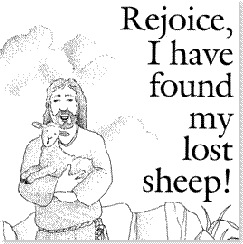Message from: Fr. Jose
My Dear Brothers and Sisters,
 If the parable of the rich man and Lazarus in today’s Gospel (Lk. 16:19-31) is a fine example of the theme of “great reversal” found in Luke, the first reading from the prophet Amos (6:1, 4-7) is an excellent complement to that. Citing their complacency (v.1) Amos warned his listeners that the luxuries they enjoyed were in jeopardy, not because their wealth was intrinsically evil but because they refused to see the needs of the poor and use their considerable resources to alleviate their plight. In short, Amos affirms that the Lazaruses among us have been ignored form time immemorial.
If the parable of the rich man and Lazarus in today’s Gospel (Lk. 16:19-31) is a fine example of the theme of “great reversal” found in Luke, the first reading from the prophet Amos (6:1, 4-7) is an excellent complement to that. Citing their complacency (v.1) Amos warned his listeners that the luxuries they enjoyed were in jeopardy, not because their wealth was intrinsically evil but because they refused to see the needs of the poor and use their considerable resources to alleviate their plight. In short, Amos affirms that the Lazaruses among us have been ignored form time immemorial.
The rich man in today’s parable followed a map that did not include Lazarus and therefore he could pass by the poor man at his gate. The disciples of Jesus are not permitted to follow such a map. To do so would be to reject the new mores of the kingdom that would perceive Lazarus as a needy brother, deserving of help.
If we open our eyes wide enough, we will see Lazarus at our gate. In her book “God’s Lost Children: Letters from Covenant House”, Mary Rose McGeady describes homeless children who sleep nightly on America’s streets as scared, cold, hungry, alone and most of all, desperate to find someone who cares. Wendy, for example has been in twelve foster homes and is now pregnant, 18 and alone. Michelle was physically abused by her mother and sexually molested by her father. Christy, a runaway, telephones her mother, only to hear, “Things are so much better now that you’re not here”. Kareem, about to jump off the highest bridge he could find, is stopped by a New York taxi driver, “You’ll only be holding up traffic”, he yells.
Victims of New York’s sex industry, illegal immigrants employed for just $2.00 per hour due to the lack of a green card. Forty million Americans with no access to health care, those unemployed for weeks due to downsizing and those left in the nursing homes without any visitors are other faces of Lazarus.
Each Lazarus we meet constitutes a challenge to our humanity to the quality of our Christianity, to the authenticity of our discipleship. Have we eyes to see, ears to hear, and a heart to understand and hands to help? Do we feel like supporting the victims of the hurricanes? The Lazarus is at the gate. Shall we tend to this person now or, like the rich man in the Gospel, shall we wait until it is too late?




